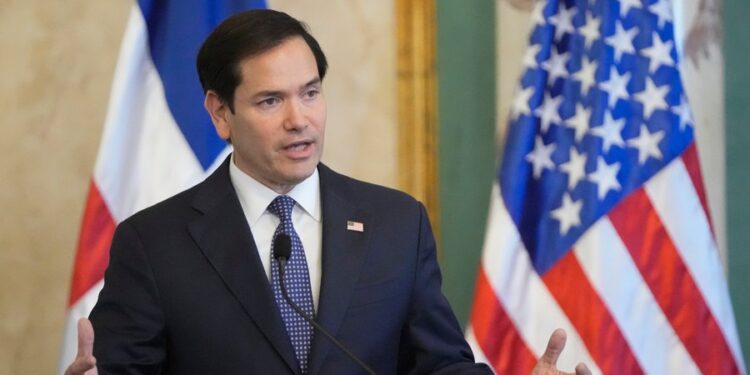
Secretary of State Marco Rubio said on Monday the United States is walking away from “dumb” foreign aid, not from foreign aid entirely.
“We’re not walking away from foreign aid,” Rubio said in an interview on SiriusXM’s “The David Webb Show” with guest host Scott Jennings. “We are walking away from foreign aid that’s dumb, that’s stupid, that wastes American taxpayer money.”
“We’re just not going to continue to do those,” Rubio continued.
Rubio said the State Department is reviewing American foreign aid commitments in accordance with President Trump’s executive order freezing new assistance for three months to allow the government to determine if programming aligns with Trump’s foreign policy.
Rubio made clear the U.S. will continue to send aid to countries in certain contexts.
“Are people going to starve to death? Are we going to have a famine? Is it going to destabilize a country in a way that would be negative to our national interest and open the door for radical jihadists or others to take advantage?” Rubio said. “We’re going to continue to do those.”
Rubio said the State Department is looking at aid in places where, he said, the definition of “humanitarian aid” has grown too expansive. He said those programs should not be the burden of American taxpayers.
“The problem is that the definition of ‘humanitarian’ has expanded beyond that — to all kinds of other things that do not make sense. That doesn’t mean they’re bad ideas. Someone should do it. It just shouldn’t be the American taxpayer,” he said.
Trump’s executive order allowed the State Department to issue a waiver exempting certain programs from the funding freeze. Rubio announced a few days later that lifesaving treatments and medications would not be subject to the freeze. The waiver did not specify which programs would be exempt from the freeze, reportedly causing some confusion at clinics overseas.
Some have specifically raised concerns about the President’s Emergency Plan for AIDS Relief (PEPFAR) program, which has saved more than 25 million lives since it launched in 2003.
Asked about PEPFAR in the Monday interview, Rubio said he supports the program but expects to have questions about it. He said the program should be getting smaller if it’s effective.
“I’m a supporter of PEPFAR. I have been in Congress. I am now as secretary of State. It’s a program we want to continue. Obviously, we’re going to have questions about it,” he said. “Look, if PEPFAR is working well, it’s a program that should be getting smaller over time, not bigger, right? Because you’re preventing HIV, you’re preventing the spread of HIV, and so people aren’t testing positive because their viral load gets down, they’re not passing it on to their children.”
“So ideally, it’s a program that over time shrinks, not expands, because less and less people are getting HIV or are transmitting it to their children. That was always the goal, was an AIDS-free generation, so no child was born with HIV,” Rubio continued.
“But it’s a program I’ve supported, and we want to continue to do it,” he added.







